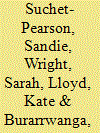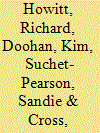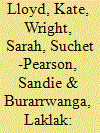|
|
|
Sort Order |
|
|
|
Items / Page
|
|
|
|
|
|
|
| Srl | Item |
| 1 |
ID:
123498


|
|
|
|
|
| Publication |
2013.
|
| Summary/Abstract |
This collaboratively written paper takes the reader on a journey to Bawaka, in North East Arnhem Land, northern Australia, to explore how a Yol?u ontology of co-becoming can inform natural resource management (NRM) theory and practice. By focusing on the process of gathering and sharing miyapunu mapu (turtle eggs) and the foundational Yol?u concept of wetj, we challenge NRM to take seriously Indigenous ways of knowing and becoming, and to attend to the vibrant, more-than-human relationality of our world. We discuss this relational cosmology, highlighting the importance of being aware and attentive, as well as the underlying ethical imperative of responsibility and obligation. We argue that as important as the concept of Caring for Country has been for NRM in Australia, it is critical that the human imperative to care for Country is balanced with a multi-directional and beyond-human understanding of the human-Country relationship. This requires engagement with the ways Country also cares and acknowledgement that humans are part of Country and not separate from it. We therefore propose a reframing, that we not only Care for Country but Care as Country. This has implications for understanding the ways that humans can and should relate to the environment as they exist together through co-becoming.
|
|
|
|
|
|
|
|
|
|
|
|
|
|
|
|
| 2 |
ID:
123494


|
|
|
|
|
| Publication |
2013.
|
| Summary/Abstract |
Focusing on the coexistence of competing and contested interests in intercultural natural resource management (NRM) systems in Australia and Malaysia, this paper explores the ways in which ontological pluralism and the interplay of socio-cultural, political-economic and biophysical influences shape NRM systems. We aim to foster a discursive space in which to reframe the challenges of capacity building in the rapidly changing spaces of intercultural NRM systems. The paper synthesizes the conceptual arguments of field research to conclude that capacity deficits of dominant institutions, processes and knowledge systems drive many systemic failures in land and sea management affecting Indigenous peoples. We advocate urgent action to build intercultural competence and new capacities and competencies in those institutions. The paper reframes intercultural NRM in terms of coexistence and invites wider debate about these 'new geographies of coexistence' in intercultural NRM systems.
|
|
|
|
|
|
|
|
|
|
|
|
|
|
|
|
| 3 |
ID:
123493


|
|
|
| 4 |
ID:
123515


|
|
|
|
|
| Publication |
2012.
|
| Summary/Abstract |
This paper draws on the collaborative experiences of three female academics and three generations of Yol?u women from an Aboriginal family from Bawaka, North East Arnhem Land to contribute to debates in development around participation, power and justice. Through a reflection on the process of collaboratively co-authoring two books and associated outputs, the paper discusses the way the collaboration is guided by collective priorities that are held as paramount: trust, reciprocity, relationships and sharing goals. The paper draws particular attention to the essential role that families and non-human agents play in shaping these priorities. The relational ontology which underlies this collaboration is inspired by a Yol?u ontology of connection that requires us to acknowledge ourselves as connected to each other, to other people and to other things. Guided by this Indigenous ontological framework, we reframe the concept of collaboration and of development as inherently and always relational.
|
|
|
|
|
|
|
|
|
|
|
|
|
|
|
|
|
|
|
|
|